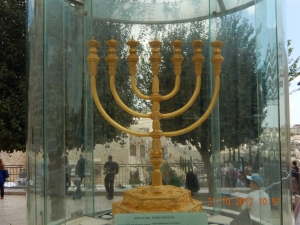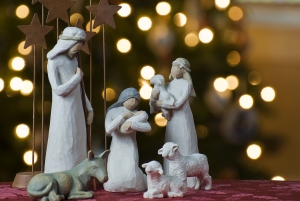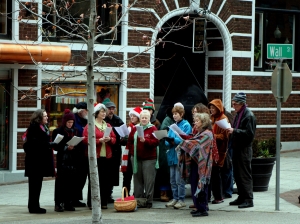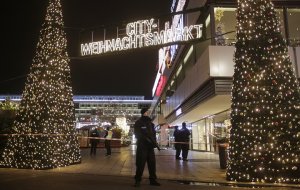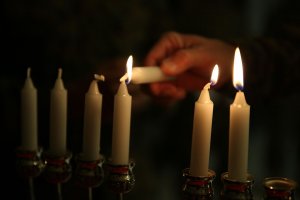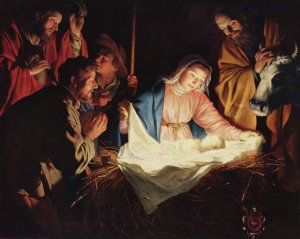General
Displaying items by tag: Christmas
Reason for the Season
The danger of losing the heart and soul of Christmas
It’s that time of year when we’re all so busy rushing about Christmas shopping that we fail to stop and think what it’s all about – that Jesus is the reason for the season.
We’re caught up in a whirl of almost mindless acquisition that mirrors much of Western society. But we can’t take any of it with us (to the next life), so why are we so frantically running after those mostly material things?
As I write, my dear mother, aged 95, is clearly seeing out her last days during which we will be doing all we can to bring comfort and peace in the midst of her pain. And I’m so glad that, in his official role as ‘curer of souls’, her vicar has been round to pray with her.
There’s nothing like such times to help us focus on what really matters – a person’s soul. That is now our chief concern, as it always is for our family, friends and neighbours.
Be Rich Towards God
Several members of my far-flung family have lost money in business in recent years, and are no doubt struggling to come to terms with that.
Similarly, much of the virtual civil war over Brexit revolves around the issue of finance. City-slickers and others who thrive on trade with Europe care little for the nation’s soul, its health, its sovereignty; they seem more concerned about the depth of their pockets. But neither staying nor leaving is likely to be a cure-all for our economic ills.
It is foolish to ignore the spiritual side of your life and leave your Maker out of the picture.
Jesus told the parable of the rich fool who built bigger barns to store his surplus grain without considering his soul or consulting his Creator. His goal was “Eat, drink and be merry!” The result was disaster. He may have been rich, but suddenly he had nothing – and God said to him: “You fool! This very night your soul will be required of you. Then who will get what you have prepared for yourself?”
Jesus adds: “This is how it will be with whoever stores up things for himself but is not rich towards God” (Luke 12:16-21). Indeed, “What does it profit a man if he gains the whole world but loses his soul?” (Mark 8:36).
It is foolish to ignore the spiritual side of your life and leave your Maker out of the picture. As with my family, financial hardship is already hitting a growing number of Westerners who have relied too long on a life of plenty. Further financial icebergs are sure to sink our misplaced hopes and dreams. But if you place your trust in the Lord, you will avoid hitting the rocks (see Psalm 46:1-3; Matt 7:24-27; Isa 54:11).
Trust in Him
The company for whom I worked most of my full-time career in journalism has just gone into administration. I had suspected something was seriously wrong when my pension fund was taken over by a ‘protection’ scheme. “So is my pension secure?” I ventured to ask the new owners. “Yes or no?”
Not surprisingly, the long-winded legally-phrased answer left me none the wiser. So, with pensions apparently going pear-shaped, I’ll keep trusting God – that’s certainly the best pension plan!
With many of us in the West finding far too much comfort and solace in material possessions of late, it’s no wonder we’ve lost focus on our souls, perhaps stopped meeting with other Christians or even forgotten the staggering glory of the Christmas story that tells of how God came down to live among us and be our comforter and strength. His name is Jesus, which means the One who saves, but he’s also Emmanuel, which means God with us.
With many of us in the West finding far too much comfort and solace in material possessions, it’s no wonder we’ve lost focus on our souls or even forgotten the staggering glory of the Christmas story.
Stay Heavenly-Minded
The slaves who worked the cotton fields of America’s Deep South had little solace in this life as they literally slaved away for hours on end under a hot sun. Instead, Heaven became their hope and comfort, even while they were still on this earth, as they sang of a brighter day and a better tomorrow: ‘Swing low, sweet chariot, coming for to carry me home’ with reference to the way the great Prophet Elijah was taken up to Heaven as he was going about his earthly business for the Lord (2 Kings 2:11).
The song is now more usually associated with England rugby matches as fans stir up their swashbuckling heroes at Twickenham. It was adopted as the national team anthem after it marked a turnaround of their fortunes 30 years ago, following a long losing run in what was then the Five Nations Championship.
With the apparent help of boys from a Benedictine school, who sang it whenever a try was scored following a tradition at their school games, England turned a 0-3 half-time deficit into a stunning 35-3 victory over Ireland.
And by the time the national team returned triumphantly from the 2003 World Cup in Australia, their plane was dubbed Sweet Chariot.
But the song surely needs to become the cry of all our hearts; and not just at rugby matches. For such heavenly-mindedness is bound to make us more earthly use as we spend time worshipping God, loving our neighbours and keeping a loose hold on our material belongings.
Be Still and Know
In the midst of the hurly-burly run-up to Christmas, I can think of no better way to conclude than by quoting today’s (12 December) More Precious than Gold devotional written by Mother Basilea Schlink, founder of the Evangelical Sisterhood of Mary, a German-based international order set up in the wake of World War II specifically to bless the Jewish people.
Heavenly-mindedness will make us more earthly use as we worship God, love our neighbours and keep a loose hold on our material belongings.
The verse on which she focuses is Psalm 46:10 (CEV): “Our God says, ‘Calm down, and learn that I am God!’”
Mother Basilea adds: “Only in quiet waters does God cast his anchor. God only draws near to a soul that enters quietness, a soul whose thoughts and feelings have been stilled. So avoid all loud behaviour and agitated speech, for they drive away the presence of God. Let everything be still within you and, where possible, around you. Then God will draw near and speak with you.”
Joy to the World!
Christmas carols sow seeds in Michigan.
This time last year, we brought you news of our evangelist friends Syd and Liz Doyle and their efforts to share the Gospel in Dearborn, Michigan, through Christmas carolling outreach. This year we are pleased to share another update from the same mission.
*****
Dear Friends and Family,
"Joy to the world, the Lord has come" echoed up the streets of the highest concentration of Arabs outside the Middle East, Dearborn, MI., on the first two Saturdays of December 2018. Despite cold, wet weather, 185 people from many different churches, ages and ethnicities came with us to sing Christmas carols. We had 25 groups made up of our own international team of Koreans, Chinese, Canadian, English, Irish and Americans and gave out about 450 gift bags! We prayed with many families and had a great time sharing “Peace on Earth and goodwill to all people!”
We carolled in a beautiful Lebanese Bakery. A large gathering of Egyptian Christians joined in singing the well-known songs of Christmas. A woman in a hijab called us over to her table to talk with us about the lighting of the Christmas tree in her hometown, Bethlehem.
One young woman, driving by, saw us walking down the street with our Santa hats and tinsel wrapped around us and pulled over to ask for a song. After singing “Jingle Bells” to her little son in his car seat we sang “Joy to the World” while she recorded the whole encounter on her cell phone. It’s our custom to not only give a gift bag with a Christmas ornament, candy, a Jesus film DVD and this year a booklet especially prepared in Arabic and English to explain the Christmas story, but we offer to pray for any needs. She asked we pray for the safe delivery of a baby she was carrying.
At one Yemeni home, tears freely flowed as we prayed for family members still in that war-torn country beset with famine and cholera.
We met families from Iraq, Iran, Syria, Yemen, Saudi Arabia, Afghanistan, Algeria, Lebanon, Palestine, Pakistan, and even Brazil. Some families invited us into their homes. Children often interpret for their parents. At one Yemeni home, tears freely flowed as we prayed for family members still in that war-torn country beset with famine and cholera.
Another reason we went carolling was to invite the neighborhood to a Live Nativity staged by the Springwells Church right in the center of Dearborn. The church was transformed into the scenes of Nazareth, Bethlehem and Jerusalem. Live animals were housed outside under a tent. Nearly 200 people attended and at least 75 Muslim people came to our feedback areas to ask questions and get more information. We were delighted to spend time answering questions and sharing together our understanding of the Christmas message.
O Syd and Liz Doyle.ne Afghan family, new to the USA, had never heard the Christmas story. When talking with some children from Yemen, we asked what they felt the most important gift ever given by God was. After visiting the Live Nativity the first child said “family,” the second, “love”. Finally a little girl of 10 said, “The most important gift God ever gave to us was JESUS!”
Syd and Liz Doyle.ne Afghan family, new to the USA, had never heard the Christmas story. When talking with some children from Yemen, we asked what they felt the most important gift ever given by God was. After visiting the Live Nativity the first child said “family,” the second, “love”. Finally a little girl of 10 said, “The most important gift God ever gave to us was JESUS!”
She is right: “For God so loved the WORLD that He GAVE His only begotten Son, that who ever believes in Him should not perish, but have everlasting life” (John 3:16).
There are many more stories - you can watch some of the action on cbn.com (coverage begins at 8:34) as CBN interviewed us for ‘The Global Lane’ programme.
Altogether: 9 gatherings, 185 carollers, 25 teams, 7 caroling times, a live Nativity, 3 parties, 550 gift bags given out, and CBN coverage! About 1600 people personally talked to and prayed with and 28 nations were touched as carollers from USA, China, Korea, Japan, Canada, Ireland and England sang to people of all ages from Iraq, Egypt, Palestine, Iran, Algeria, Ethiopia, Eritrea, Syria, Italy, Lebanon, Brazil, Mexico, Columbia, Morocco, Yemen, Kurdistan, Pakistan, Saudi Arabia, Jordan, & Kuwait! We prayed with some to receive Christ- only God knows the total outcome!
May you and yours have a safe and Happy Christmas!
Syd & Liz Doyle
Find out more about Syd and Liz Doyle at Nations Light Ministries website.
Light in the Darkness
No-one holds a candle to our Lord Jesus, who brought light and life to all who believe
As we approach the traditional season of Christmas, we (in the Northern Hemisphere) are all too aware of the gathering gloom of midwinter, and are anxious to help dispel the darkness with a multiple array of bright lights.
The Prophet Isaiah addressed this dilemma when he proclaimed that “the people walking in darkness have seen a great light” (Isa 9:2) – although he was thinking more of man’s spiritual condition than their general environment.
Written around 600 years before Christ, this is one of his many references to the coming Messiah, and points (in the preceding verse) to the very region where he would engage in most of his earthly ministry – “Galilee of the nations [or Gentiles]”.
In the midst of the oppression of Roman occupation, a Jewish virgin would give birth to a son, who would be ascribed a series of majestic titles including ‘Prince of Peace’.
Feast of Dedication
As with Christians, Jews at this time of year also light up the darkness with a glittering host of candles to celebrate Hanukkah, the feast of Dedication.
I well remember sharing the excitement of the occasion with Jerusalem residents five years ago, as joyful groups celebrated in restaurants festooned with brightly coloured lights and menorahs.
Though not among the prescribed seven feasts dating back to the time of Moses, Hanukkah is an eight-day Jewish festival Jesus himself attended and is celebrated close to Christmas (appropriately, though not intentionally) to mark God’s miraculous intervention during the reign of the ruthless Syrian-Greek emperor Antiochus Epiphanes. He desecrated the Jewish Temple by sacrificing a pig there and blasphemously proclaimed himself God.
As with Christians, Jews at this time of year also light up the darkness with a glittering host of candles
Judah Maccabee led a brave and successful revolt against the tyrant in 164 BC and re-established temple worship (Hanukkah means ‘Dedication’) with the aid of the menorah (seven-branched candlestick) which burned miraculously for eight days despite having only enough oil for a day. The Greeks had polluted the rest.
In my opinion, the feast also foreshadows the coming of the Jewish Messiah Yeshua (Jesus), described as “the light of the world”, and I’m sure it’s no coincidence that it falls around the same time as Christmas (even though it is more likely that Jesus was born in the autumn) when much of the world is lit up with elaborate decorations to commemorate his birth some 2,000 years ago.
Messianic Jews (who do believe Jesus is their Messiah) celebrate both feasts and it is interesting to note that the sight of a menorah as part of the festive decorations is increasingly common.
The Only Hope for Peace
And yet, at a time when billions of people celebrate the coming of light into the world in the person of Jesus Christ, a dark evil casts a shadow over the place of his birth as sabre-rattling surrounding nations threaten the very existence of Israel.
Paradoxically, the spectre of Armageddon continues to loom each year just when the world focuses on the coming of the ‘Prince of Peace’.
Armageddon is not some sci-fi invention of a film-maker’s overactive imagination. It’s a reality; for there will come a time, very possibly in the near future, when the nations of the earth will clash in a catastrophic battle on the plains of Megiddo in northern Israel – the Bible makes this clear. But then the Messiah will return in power and great glory to put an end to war and usher in a thousand-year reign of absolute peace.
As my wife and I were reminded a few years ago in a Christmas card from the Jews for Jesus organisation, the baby born at Bethlehem is the only hope for peace in the Middle East.
Explaining the feast of Hanukkah, a Jews for Jesus spokeswoman said: “That is why each year we kindle our lamps, one light for each of the eight nights,” adding: “The Hanukkah Menorah has nine branches and we light each of the branches with the ninth candle, the shammas or servant candle. The light of the menorah reminds us of our Messiah Jesus, the Servant King, of whom the Apostle John said: ‘The true light that gives light to every man was coming into the world.’
“We can’t help but see the connection between the light of Hanukkah and the light that pierced the darkness when Yeshua [Jesus] was born. During this Hanukkah and Christmas season, let us remember that the light of the world has come among us to bring hope and life to all who believe.”
In my opinion, Hanukkah foreshadows the coming of the Jewish Messiah Yeshua (Jesus), described as “the light of the world”.
Shining in the Darkness
But as Jesus was misunderstood, so are his followers. As John also wrote: “The light [of Christ] shines in the darkness, and the darkness has not understood [or overcome] it.” (John 1:5).
Conflict over Jesus’ claims was also apparent during the Hanukkah feast he attended. John writes: “Then came the Festival of Dedication at Jerusalem. It was winter, and Jesus was in the temple courts walking in Solomon’s Colonnade. The Jews who were there gathered around him, saying ‘How long will you keep us in suspense? If you are the Messiah, tell us plainly.’ Jesus answered, ‘I did tell you, but you do not believe…’” (John 10:22-25).
Millions of Christians today testify to being among those who once walked in darkness, but have since seen “a great light”. Their testimony is the same as the slave ship captain turned hymn-writer John Newton, who so beautifully reflected the truths of the Gospel with the words: “Amazing grace, how sweet the sound, that saved a wretch like me; I once was lost but now am found, was blind but now I see.”
Christmas Priorities
Jesus wasn’t born on 25 December. Does it matter?
It is a remarkable thing that all around the world, over the next days and weeks, there will be millions, if not billions of people celebrating what we call Christmas.
In our modern day it comes in many different forms. Those of us who remember those simpler family times of the 1940s and 50s (or earlier) may feel uncomfortable with the worldly emphases of today, whose glitter soon fades away. Many Christians will seek to focus on the central reason for Christmas, preserving the memory of the birth of the Son of God, the promised Messiah of Israel.
Yet, even so, more and more Christians are realising that Christmas was not celebrated by the first disciples of Jesus the Messiah (Yeshua HaMashiach), who would have recognised only the biblical feasts. More and more, the traditional Christian interpretations of Christmas are found to carry errors of interpretation – even in the wording of some of the favourite traditional carols.
It is all too easy to either blind oneself to the reality of Christmas all around, or, at another extreme, reject the season’s celebrations outright with rather a negative response. It would seem that the Lord is taking us through a period of transformation – gradually – in preparation for, not his first coming, but his second coming.
So, what about this year? What is the real priority?
Meeting Us Where We Are
When Jesus was here in the flesh he entered a world with established traditions. Among those traditions were two feasts added on to the main Levitical feasts of Passover, Pentecost and Tabernacles. The feasts of Purim and Hanukkah were part of the yearly traditions of the Jews. They were not given as part of the Mosaic Law, so it is surprising that Jesus seemed to celebrate them, rather than correct them.
It is all too easy to either blind oneself to the reality of Christmas all around, or, at another extreme, reject the season’s celebrations outright.
Some would consider that his lack of opposition to these feasts meant that he accommodated them as correct traditions. Perhaps so. Perhaps, however, we could look at it from another angle. Could he not simply have taken things as he found them and focussed positively on his chief purpose: to minister to the poor and to proclaim the Kingdom, leaving it to his hearers to respond in all aspects of their lives?
What would Jesus do if he came to earth this Christmas? What would be his priority in our season of a non-biblical festival? Perhaps he would not confront it, but accept the context in which he found the world – meeting us where we are. Would his priority, despite so much wrong, still be to minister to the poor and to proclaim the Kingdom, rather than argue about the trappings that have accumulated around Christmas?
Our Task
We know that Jesus is unlikely to come down to earth on 25 December 2017. However, he does still move among the people of our modern world – in his people, by the power of his Spirit. Therefore, it is up to us to fulfil his priorities for the season.
With that in mind, whatever we think of Christmas today, let us consider the poor and proclaim the Kingdom – the season affords us great opportunities.
Among all others at Prophecy Today I extend my seasonal greetings.
Immanuel – God be with us.
Clifford Denton
Chairman of the Board
Focus On the True Light!
Avoid the new religion that seeks to dazzle through glitter and sparkle
Coming back to the UK after our unexpectedly lengthy tour of Israel, we were particularly struck by the emphasis on Christmas – even our cappuccino at Heathrow had to be decorated with a tree-shaped sprinkling of chocolate!
Christmas lights soon beamed on us from all sides, reflecting less on the theological aspect of the feast as on the usual glitz and glamour and commercial hype we have all come to know and love – perhaps not!
And then there were massive crowds at the shops on Sunday – now the new religion on what used to be the Christian Sabbath. In Bawtry, on the edge of Doncaster, Christmas trees were lavishly bedecked with baubles in a brilliant array of colours – and, as ever, we sense the danger of not seeing the wood for the trees.
I am reminded, however, that festive lights will also now be adorning Jerusalem in celebration of Hanukkah – marking the time when the menorah candle burned miraculously for eight days despite having only enough oil for one, following victory over the Syrian-Greek emperor Antiochus Epiphanes who desecrated the Jewish Temple by sacrificing a pig there and blasphemously proclaimed himself God. But focus on what the light means, not on its beams!
Look for the True Light
For we’re submerged in so much darkness today – not least the marginalisation of the Christian Gospel to the point where it has become politically incorrect – and yet we all make a big fuss of this incredibly important Christian festival!
In truth, all these bright lights are, for the most part, dragging us further into the gloom of materialism, partying and pointless debt, rather than towards the true light to which they are allegedly designed to draw our attention.
So my Christmas (and Hanukkah) message to readers is: don’t look for the bright lights; look rather for the true light “that gives light to everyone”, according to John the Baptist (John 1:9) – a light that leads to everlasting life, and is not snuffed out with the brief passing of our lives.
Yes, we all like shiny things, but unless they are part of Heaven’s treasure, they will fade and rust and turn to dust (Matt 6:19-21).
All these bright lights are, for the most part, dragging us further into the gloom of materialism, rather than towards the true Light.
The Significance of Jesus’s Coming
A famous passage of Scripture, often associated with Christmas, speaks of the light that the Messiah will bring to the world. Its context, most significantly, is of the darkness of the occult, which has gripped so many in our day (Isa 8:19).
The prophet, however, goes on to predict a great honour that would be bestowed on the region to which he refers as ‘Galilee of the nations, the Way of the Sea’: “The people walking in darkness have seen a great light; on those living in the land of deep darkness a light has dawned” (Isa 9:2).
A major highway at the time, connecting Asia, Africa and Europe, straddled the coast of Israel before moving inland towards Galilee and then beyond into Syria. Galilee was thus an international crossroads whose people were immensely privileged to have seen a great light when Jesus came among them.
No Longer Inhabited
 The ruins of Capernaum. See Photo Credits.Yet many rejected him and failed to grasp his significance. True, 2,000 years later he is still much spoken against, but he is nevertheless the most famous man who ever lived. He performed many miracles in Galilee – in Capernaum, Chorazin and Bethsaida – and warned those cities that they would be judged for their rejection of Messiah.
The ruins of Capernaum. See Photo Credits.Yet many rejected him and failed to grasp his significance. True, 2,000 years later he is still much spoken against, but he is nevertheless the most famous man who ever lived. He performed many miracles in Galilee – in Capernaum, Chorazin and Bethsaida – and warned those cities that they would be judged for their rejection of Messiah.
As for Capernaum, where much of his ministry took place, he said: “Will you be lifted to the heavens? No, you will go down to Hades; for if the miracles that were performed in you had been performed in Sodom, it would have remained to this day” (Matt 11:23). Capernaum was destroyed by an earthquake in 749 AD. We could only view its ruins. Yet a short distance away is the town of Migdal, still a thriving community where former prostitute turned passionate believer Mary Magdalene came from.
A little further down the coast still is the city of Tiberias, a popular resort frequented by the occupying Romans in Jesus’s day – yet it is not mentioned in the Gospel accounts. Also not mentioned is Sebastia, the ancient capital of Samaria up in the hills, which was the ‘in’ place for the jet-set of the day, with its spa and baths adorned with beautiful columns. Now, apart from a few remaining columns, it is a barren ruin in a dustbowl with little to suggest it was the Las Vegas of a bygone era.
The true light came first to Galilee, but many rejected him and failed to grasp his significance.
The Obedient Blessed
Meanwhile, seemingly insignificant events and people have changed history. One example is Joppa, now known as Jaffa, at the southern tip of Tel Aviv. It was there, in the house of Simon the Tanner, that the Apostle Peter had a vision, and because he acted upon it in obedience to the Lord, it became the means by which the Gospel was preached to the entire Gentile world.
The Roman centurion Cornelius, 40 miles up the coast, had a similar encounter, and he acted upon it because he was a God-fearing man who loved the Jews. Genesis 12:3 tells that those who bless the seed of Abraham will themselves be blessed while those who curse them will come under judgment. And so the Holy Spirit fell on these Gentile believers.
Life in All its Fullness
Joppa (now Jaffa) is once more significant today as the entry point of Jews returning to Israel from every corner of the globe. Airliners from all over the world fly over this ancient port bringing the scattered seed of Abraham back to the Promised Land.
 The bright lights of Tel Aviv. See Photo Credits.
The bright lights of Tel Aviv. See Photo Credits.
What’s more, many of them are now turning back to the Lord, having acknowledged Jesus as their Messiah. And we worshipped with some of them (in Hebrew), which was an amazing privilege. It was such a moving experience to witness hands and eyes lifted to the skies in praise and adoration of the Lord we love.
And they are reaching out to a world still lost and confused; Tel Aviv is a hedonistic city where many indulge in a club-and-coffee bar culture that leaves little room for God. But there is a great openness. They may be lost, but they are looking for a Shepherd. Pray that their eyes will be open; go if you can and tell them about Yeshua (Hebrew for Jesus). They are looking for fun and fulfilment, but they often find mere emptiness, as at the bottom of a beer glass or coffee cup.
Like us in Britain, they too are looking for the bright lights, but are so dazzled by the glitzy neon signs that they miss the real thing – the true light that gives light to every man. Jesus says: “I am the light of the world. Whoever follows me will never walk in darkness, but will have the light of life” (John 8:12).
Like us in Britain, Israelis too are looking for the light, but are so dazzled by the glitzy neon signs that they miss the real thing.
Light to the World
As I was standing on the Mount of Olives, I contemplated how Jesus paid such a heavy price for our salvation as he sweated blood among the olive trees in the Garden of Gethsemane below.
The olive tree is a symbol of the Messiah. Its fruit is harvested using sticks to beat them down from the overhanging branches; Jesus was whipped for us. The olives are then crushed for their oil; Jesus was crushed for our iniquities (Isa 53:5). But the oil is then used to light a candle…to bring light to the world!
Let’s focus on the true light this Christmas – and Hanukkah.
Prayer Request: Carolling Outreach
Taking festive opportunities to share the Good News of Jesus Christ.
We are delighted to bring you a prayer request from our friends Syd and Liz Doyle, inspirational evangelists from the US. Read on to be encouraged – and perhaps inspired to do something similar in your community!
Dear Praying Friends,
We are asking for special prayer as we go Christmas caroling in the Dearborn, MI area this Saturday afternoon and evening (2 December, 2017).
This year we are planning our annual ‘Caroling to our Neighbors’ on 2nd December, meeting at 1pm and also 5pm. It's our 13th annual Christmas Caroling Outreach. We are expecting around 200 carolers from many different churches and groups from southern Michigan and northwest Ohio to join us!
We begin with prayer, a bit of training, simple instructions on how to approach the doors and what to say and do - then we organize ourselves in groups of 6-8 and go out to assigned streets prepared to give out 500 gift bags and share the love of God with our Arab/American friends.
Christmas caroling is a tradition for many of us, but is a new experience for most Arabs. When they open the door they are delighted as they listen to us sing. They are very hospitable and often invite us in for delicious treats.
We also bring a present for them - a gift bag filled with Christmas material, a Jesus story DVD, a New Testament in Arabic, and some candy.
We ask each family if they have any prayer needs, then pray for them. Pray for receptive hearts as the Lord shows His love to them. Pray for the weather to be good, and for us as carolers to follow the lead of the Holy Spirit as we sing, pray and give the gifts.
We are also inviting each family to a "Live Nativity" to be presented at church the following day. We hope the draw of the animals and the story of Christmas will bring many to the church and to Jesus Christ the Savior of the world!
Thanks for praying for safety, boldness, love, friendliness and peace for everyone.
Happy Christmas, prayer warriors!
Syd & Liz Doyle
Choose Life!
How can we celebrate the joys of Christmas in the midst of such a broken world?
This week leading up to Christmas has been utterly incongruous. Celebrations have been marred by news of the atrocious terror attack in Berlin, when a lorry was driven into crowds at a Christmas market in a repeat of the Bastille Day attack in Nice, this time killing 12 and injuring 48. Meanwhile, decorations and festivities have felt almost inappropriate as tens of thousands are being evacuated from Aleppo.
For those of us who celebrate Christmas, particularly with a desire to rejoice in the birth of the Son of God, how do we do so in view of a shaking, hurting world? Should we be indulging whilst others are suffering?
Rejoicing Amidst Suffering
I was led today to research some of the carols we sing at Christmastime. I have duly discovered that, like most great hymns, many of these were written by men and women of faith in challenging circumstances. They were inspired in the midst of struggle and strife to pen words about the hope offered to us by Jesus our Lord.
 Refugees from Aleppo arrive at a camp near Idlib, Syria. AP/Press Association Images.
Refugees from Aleppo arrive at a camp near Idlib, Syria. AP/Press Association Images.
As such, these carols that we all know so well are far more than profound words set to beautiful music, to be sung for the sake of tradition. They have stories, emerging from turmoil and trial and speaking back to it. They are enduring reminders of the hope of the Gospel - particularly of its proclamation of life and light in the face of violence, fear and darkness.
Some Examples: Songs Born of Trial1
I Heard the Bells on Christmas Day was penned during the American Civil War by Henry Wadsworth Longfellow. Henry's son was a lieutenant in the Unionist army who had been severely wounded fighting in Virginia. Longfellow wrote the words as a poem on Christmas Day, 1863, emphasising the Gospel's promise of hope for peace amidst the trials of war.
Then pealed the bells more loud and deep:
'God is not dead, nor doth He sleep;
The Wrong shall fail, the Right prevail,
With peace on earth, good-will to men.'
Also during the American Civil War, O Little Town of Bethlehem was written by American bishop Phillips Brooks in Massachussetts. Brooks wrote the carol after a visit to the Holy Land in 1865, where he found such peace compared to the horrors of war back home that he was deeply moved.
No ear may hear His coming, but in this world of sin,
Where meek souls will receive him still, the dear Christ enters in.
A few years earlier, in 1849, It Came Upon the Midnight Clear was penned – also in Massachusetts, this time by preacher Edmund Sears. Sears was a burnt-out pastor who, at the time, was extremely depressed about the state of the world, with news of revolution in Europe and recent war on his home territory between the US and Mexico.
And man, at war with man, hears not the love-song which they bring;
O hush the noise, ye men of strife, and hear the angels sing.
Across the pond, As with Gladness Men of Old came through English insurance broker William Chatterton Dix in 1859. During his 20s Dix was struck with ill-health and depression – and wrote many of his best-loved hymns during this time.
Holy Jesus, every day, keep us in the narrow way;
And when earthly things are past, bring our ransomed souls at last
Where they need no star to guide, where no clouds Thy glory hide.
More than a century earlier, Joy to the World was written (1719) by English pastor and prolific hymn-writer Isaac Watts. Watts came from a non-conformist family used to being chastised for their beliefs. Joy to the World is based on the second half of Psalm 98, and was actually written to glorify Jesus' Second Coming, rather than to celebrate his first! Its lesser-sung third verse states:
No more let sins and sorrows grow, nor thorns infest the ground;
He comes to make his blessings flow, far as the curse is found...
Perhaps most pertinent to the times in which we now live is Come, Thou Long Expected Jesus, for which we have Charles Wesley to thank. Wesley, who also gave us Hark! The Herald Angels Sing, wrote Come, Thou Long Expected Jesus in 1744 after meditating on Haggai 2:7 and being particularly moved by the plight of orphans in his area. As with Joy to the World, this carol was intended to help people use Christmas to prepare for the Second Coming of Jesus, as well as to commemorate the First.
Come, thou long expected Jesus, born to set thy people free;
from our fears and sins release us, let us find our rest in thee.
Israel's strength and consolation, hope of all the earth thou art;
dear desire of every nation, joy of every longing heart.
A Cloud of Witnesses
So, it seems that there is not necessarily such a stark gap between our Christmas celebrations and this world of strife after all.
Those who have gone before us, who form part of the great cloud of witnesses (Heb 12:1), found a way to rejoice in the midst of difficulty. Their joy was not unthinking, selfish or insensitive – in fact, it was the more profound and laudable because they understood the glorious truth of Emmanuel, God with us, meeting and rescuing us in our brokenness, bringing light to our darkness.
The carols we sing at Christmas have stories - many emerged from turmoil and trial and speak back to it even today.
A Light Has Dawned
The tragedy that has unfolded through the history of humankind is this: we have been given a choice between light and darkness - but all too often we choose the darkness (as the terrible destruction of life in Berlin this week demonstrates vividly).
John's account of the birth of Jesus, so often read at Christmastime, states "In him was life, and that life was the light of men. The light shines in the darkness, but the darkness has not understood it" (John 1:5).
Towards the end of his life, Moses said to the people of Israel "I have set before you life and death, blessings and curses. Now choose life, so that you and your children may live!" (Deut 30:19). The festival of Christmas once again presents us with that same choice. Today, in the face of such reckless and evil destruction, our loving Father God urges us to choose life.
If we choose life, the Lord Jesus, who is the Light of the World, can dwell in us, transform us and shine out through us to others. The trials of this world, though grievous, will not overcome us but will instead be turned for good by the loving hand of the Lord.
Back to Christmas
Let us then respond to our first question – how can we celebrate this Christmas whilst others are suffering? Well, if we choose life and pursue it, selfish indulgence with flagrant disregard for the plight of others simply won't be a part of our lives. Instead, we will find ourselves experiencing a deeper kind of rejoicing – a thoughtful, loving and faithful jubilation that is not blind to suffering (indeed, quite the opposite), but is fixed first upon hope – in Jesus' death, resurrection and soon return – as the true and only solution to all the world's evils.
If we choose life, it may well be (and it is my hope) that this century will yet see its Wesleys and its Watts, its Whitefields and its Spurgeons, using Christmas to rejoice, to draw near God and to bring the light of life to millions. Who knows – the era of inspired carol-writing may not yet be over!
References
1 Carol information gleaned largely from Wikipedia, from which individual referencing information can be obtained. Also recommended is Christmas Carols by Andrew Gant (2014, Profile Books), a secular book which covers the historical origins of a broad selection of Christian and non-Christian Christmas songs.
Light in a Dark World!
Jewish and Christian feasts in rare convergence.
When the stars lined up to lighten the path of the Wise Men as they travelled from the East to worship the new-born King of the Jews, it was the dawning of an amazing new era: an era of light.
Now, 2,000 years later, the Jewish feast of Hanukkah coincides with Christmas. They are usually close together, but such a precise convergence doesn't often happen (the last time was 2005; before that it was 1959). Both are festivals of light cheerily illuminating our dreary winter days with sparkling symbols of God's intervention in human affairs.
But at a time of unprecedented threat both to Israel and the Gentile Christian world, are we about to see God's light shine as never before in the midst of the darkness, with growing recognition – especially in Israel – of the Messiah who appeared as a helpless babe in Bethlehem?
The Story of Hanukkah
Special candles will be lit all over Jerusalem to remind her people of the time, in 167 BC, when God came to their rescue. The ruthless Syrian-Greek emperor Antiochus Epiphanes had desecrated the Jewish Temple by sacrificing a pig there and blasphemously proclaiming himself God. Judah Maccabee led a brave and successful revolt against the tyrant and re-established temple worship ('Hanukkah' means dedication) with the aid of the menorah (seven-branched candlestick) which burned miraculously for eight days despite having only enough oil for a day – the Greeks had polluted the rest.
I believe this event foreshadowed another great rescue, less than two centuries later, when the Jewish Messiah – the light of all mankind (John 1:4) – was born in a stable at nearby Bethlehem, as prophesied in the Scriptures (Mic 5:2). And now, much of the world is lit up with brightly-coloured decorations – for many people, in commemoration of his birth.
"The people walking in darkness have seen a great light..." Isaiah prophesied of Yeshua (Isa 9:2) who did not at first lead Israel in a military victory, although that will indeed happen one day (Zech 12:9), but came to cast his glorious light on a dark world and bring peace, hope and comfort to all those who seek him.
At a time of unprecedented threat, are we about to see God's light shine as never before in the midst of the darkness?
King of the Jews
I love Christmas, partly because it draws my faith back to its roots in Israel. Tragically, much of the Western Church seems for the rest of the year to have divorced itself from the Jewish state, as if it were unrelated to the ongoing story of the Church.
 Hanukkah in Israel, 2013.
Hanukkah in Israel, 2013.
But there is no getting away from the Messiah's birth being inextricably linked with Bethlehem and Jerusalem, as the carols clearly reflect: Once in Royal David's City, O Little Town of Bethlehem, O come, O come, Emmanuel...shall come to thee O Israel. And, in The First Nowell (an archaic word for Christmas), the chorus keeps repeating the line "born is the King of Israel!"
The Bible clearly teaches that the Messiah will come first as the "suffering servant" (Isa 53) and then, in the fullness of time, as the King of Kings and Lord of Lords, ruling and reigning from Jerusalem as the 'Lion of the tribe of Judah' (Rev 5:5) after finally defeating God's enemies on the mountains of Israel.
So it is that, as with his first coming, the focus returns to Israel for his second advent. Should we Christians not more adequately prepare ourselves for this great event by re-aligning our hearts with the hopes and aspirations of God's chosen people? We are in this together.
The anti-Semitic hatred currently manifested through Islamic State and related terrorist groups (and in past generations through Haman, Hitler and others) is directed at those who look to the God of Israel – first the Jews, then the Christians. Encouraged by growing co-operation on this level in the face of an implacable foe, we hope for increasing revelation for all that the child born to a virgin (Isa 7:14) is the true Messiah – Emmanuel (God with us) – who fulfilled all the Jewish scriptures. As the carol put it so beautifully, "He came down to earth from heaven, who is God and Lord of all." It's an awesome truth. He is the Prince of Peace (Isa 9:6) promised, first to the Jews, and also to the Gentiles (Rom 1:16).
There is no getting away from the Messiah's birth being inextricably linked with Bethlehem and Jerusalem.
Bringing Light to All Who Will Believe
Friends from Ireland, Velma and Alan Beattie, at a Christian worship festival in Antrim, Northern Ireland, recently heard the amazing first-hand account of a man who had just returned from Ethiopia, where he had been to look for a remote Jewish village that is under severe persecution. "When he arrived he was told that the people had seen a vision that a man would come bringing light to them. And so he was able to share with them about the light of the world, Yeshua!"1
Avi Snyder, European Director of Jews for Jesus, tells of a time when his colleague Julia asked a young woman called Miriam to read Isaiah 53, written around 700 BC. "Miriam's eyes literally grew wide as she read from her own Bible the description of the Servant of the Lord killed as an atonement for our sins."
"Does this sound like anyone you've ever heard about?" Julia asked. "It sounds like Jesus," Miriam replied. And, after re-reading the passage, she asked, "Why don't the rabbis believe this?"
"Actually, that's the wrong question," Julia said. "The right question is, 'why don't you believe this?'" Miriam thought for another moment, then said, "I do."2
Just a few chapters later, Isaiah wrote, "Arise, shine, for your light has come, and the glory of the Lord rises upon you. See, darkness covers the earth and thick darkness is over the peoples, but the Lord rises upon you and his glory appears over you. Nations will come to your light, and kings to the brightness of your dawn" (Isa 60:1-3).
As with Jesus's first coming, the focus returns to Israel for his second advent.
The Festival of Dedication
Jesus himself celebrated Hanukkah – also referred to as the 'Festival of Dedication' – and it was there that he came under fierce attack from the Jewish religious leaders. As they debated with him about his identity, they threatened to stone him for blasphemy because he claimed to be the Son of God (John 10:22-42). The encouraging thing about this account is that Jesus subsequently returned across the Jordan to where his cousin John had earlier been baptising, and many followed him there and came to believe in him.
Today we rejoice that more and more Israelis, along with Jews across the diaspora, are putting their trust in Yeshua who, at Christmas, came to dwell (or tabernacle) among us (John 1:14).
Have a happy Hanukkah and a blessed Christmas!
References
1 CMJ Ireland News, October 2016. [CMJ = Church's Ministry among the Jewish people.]
2 Jews for Jesus Newsletter, December 2016. Adapted excerpt from Avi Snyder's forthcoming book Jews Don't Need Jesus – and Other Misconceptions, due out in the spring of 2017.
Are You Ready for Christmas?
Clifford Denton discusses the probable date of Jesus' birth, how we got to 25 December and what that means for us today.
There is no known record from early Christian writers concerning the celebration of Christmas. For example, neither of the prominent writers Tertullian (c. AD 155-220) or Irenaeus (late 3rd Century AD) included Christmas in their lists of Christian feasts. It is therefore generally considered that the Christian festival of Christmas began being celebrated officially sometime after AD 300. In terms of the date we use now, 25 December, the first recorded celebration was in Rome in AD 336.1
The Pagan Roots of Christmas
Many Christians are now re-thinking the practices of the faith, being concerned to return faithfully to its Hebraic roots. They are concerned that what may have begun as a genuine remembrance of the birth of Jesus (possibly in the 1st Century AD, incorporated into the biblical Feasts of the Lord) was moved to 25 December in an attempt to Christianise the pagan Roman festival of the sun god Sol Invictus, celebrating the 'birthday of the sun'. In the English language this allows an interesting play on words, but other than that it is not difficult to see that the marrying of the two celebrations is rather fragile.
However, there can be no doubt that God has brought much blessing to families and communities, and immense opportunities to proclaim the Gospel, during the Christmas season. The birth of Jesus is recorded in Scripture and it is something to celebrate every day. Indeed, if we were able to establish the correct date for his birth then Christian ethics of love and sharing and many of the wonderful carols we sing at Christmas could transfer seamlessly to that date or season.
So let us not be too harsh in our judgment as we celebrate this Advent season once more - but let us get our focus clear. Once more we will surely know the blessing of God; yet we might also consider whether he is gradually seeking to re-focus us - and why.
Christians desiring to recover the Hebraic roots of the faith often become concerned that the remembrance of the birth of Jesus was moved to 25 December.
When Was Jesus Really Born?
When, then, was Jesus actually born? We have no clear conclusion from Scripture, but it does give us clues to develop a compelling argument that it was during the Feast of Tabernacles.
Let us begin in Luke 1:5, where we discover that Zacharias was a priest from the division of Abijah. The divisions of the priests were established by King David (1 Chron 24) who appointed 24 Levitical families in a certain order for ministering in the Temple. We discover (verse 10) that Abijah was the seventh division, which would place his priestly responsibility in the first half of the fourth month. If the counting of the Jewish year began at Passover (the beginning of the biblical year – Exodus 12:2), the fourth month after Passover would be Tammuz (around June/July).2 We can then estimate when John the Baptist was conceived, i.e. after Zacharias returned home in the middle of the fourth month (Luke 1:23-24).
We know, by reading on in Luke 1, that it was after six more months that Jesus was conceived by the power of the Holy Spirit. All this has some approximation, but in putting the clues together there is a strong suggestion that John the Baptist would be born nine months on from the second half of Tammuz: in the middle of the first month (Nissan) of the following year. Jesus would be born six months later, in the middle of the seventh month (Tishrei, around September/October).
Bearing in mind that the Feast of Tabernacles begins on the 14th day of the seventh month (Lev 23:34), the calculation may be exact to that date. If not exact, the strong implication is that Jesus was born (i.e. came to earth to dwell/tabernacle amongst us) during the season of the latter feasts, which includes both the Day of Atonement and the Feast of Tabernacles, a feast announced with the blowing of Trumpets.
All this makes much more sense than 25 December, especially when it also brings to mind his Second Coming, which will also be announced by the blowing of a trumpet (1 Thess 4:16)!
So What?
So, what does this mean for us who are already well into another traditional Advent season? I have, for many years, been among those who have desired and encouraged a return to the biblical roots of our faith. Yet, I have also known the blessings of a traditional Western Christian Christmas, especially as a child in the 1940s and 1950s in post-World War II Britain, when family bonds were strong and when community Christmases centred on remembering the birth of Jesus.
I know that some of those who strongly promote the Jewish roots of Christianity would be quick to argue against any Christmas emphasis, but personally I am uneasy about over-reacting in this. Is our Father in Heaven, whilst increasingly warning us of the pagan roots of the celebrations around 25 December, nevertheless encouraging us to get our priorities straight rather than acting in haste? The Sabbath was made for man and not man for the Sabbath!
The implication of Scripture is that Jesus was born on the Feast of Tabernacles - or at least during the season of the latter feasts.
Priorities in Our Remembering
Jesus told us to remember his death until he comes (cf. his birth), through the sharing of the bread and wine of Passover. Yet, in balance, we must also remember his birth as the Son of Man.
It could well be that he was born on the Feast of Tabernacles. Those shepherds in the fields near Bethlehem were most likely those who cared for the flocks of lambs prepared for slaughter at the Feasts. How appropriate that they were among the first to see the Lamb of God, who had come to take away the sins of the world. And if it was the time of this Feast, then it is little wonder that the inn in Bethlehem was so full of pilgrims. How differently we understand the Christmas story when taken in context.
As to the exact date, even though it is not known for sure, we are surely to understand that the Feast of Tabernacles will be fulfilled through the Second Coming of Jesus. If we divert our attentions away from this truth, we will end up unprepared for his arrival. Conversely, recalling his First Coming at the Feast of Tabernacles will help us to prepare for his Second Coming, through concentrating on the priorities of that Feast. If Passover helps us look back and remember his death, then Tabernacles helps us recall his birth and, more importantly in the context of our age, look forward to his return.
Look Up!
As we celebrate this year, let us do so whole-heartedly, as our Thought for the Week this week encourages us to do. Surely, God will still bless us as we sing carols, witness in the world and share love together in community and family. But let us not be foolish with the worldly trappings that divert us from the prime focus of the season. And let us not look down overmuch at the troubles of this world, nor concentrate our attention too exclusively on a now-empty manger.
In the coming days it is my hope that we will gradually adjust our perspective on what we call Christmas, to re-home it among the biblical Feasts of the Lord (especially in relation to Tabernacles). Perhaps our attraction to the tinsel of Christmas will fade away! But whatever happens, let us look up, for he will come back when the world least expects him. Indeed, is it now time to concentrate more on his Second Coming than on his First? Are you ready for Christmas?
Is it time to focus more on Jesus's Second Coming than on his First?
Notes
1 See Wikipedia's page on the origins of Christmas.
2 Ezra, after the Babylonian captivity, led Judah back to the biblical pattern of worship. It is a reasonable assumption that the order of the priesthood would be according to the pre-captivity order, but it is an assumption.
Books Change Lives!
Today, Prophecy Today publishes its 30th review since the magazine went live in April. What will you be reading over Christmas?
Our goal has been to review books and resources that will be of interest to the discerning Christian. As Christmas approaches, why not look back through our reviews - and perhaps even let them inspire you to make some purchases? To encourage you in your reading endeavours, here is a brief note from the editor of St Andrew's Christian Bookshop.
A Note from St Andrew's Bookshop
Over the last year I have discovered some alarming facts; not only is the number of Christian books being sold still in decline, but when a Christian bookshop closes very little of its sales are picked up by nearby bookshops – possibly up to 95% is lost. A recent Evangelical Alliance survey on Bible reading reported that people under 44 years old read the Bible on average 40% less than people over 44 years old (I would suspect a survey on the reading of Christian books would be even more telling!). And when discussing all this with the Right Revd. John Pritchard, the former Bishop of Oxford, he stated that he believes many Christians are now 'religiously illiterate'! If the church is not reading Christian books it is missing out on a rich vein of spiritual knowledge and information to help us understand what we believe and why.
So what does this all mean for us in our bookshop ministry?
For me it has been both releasing and exciting that the decline of the Christian bookshop is not inevitable.
Yes, the market has changed. Many of us have to accept the collapse of sales from Sunday School prize-giving, the decline of church hymnbook sales as churches move to the big screen, and the gradual end of many regular church bookstalls.
The challenge ahead for all of us in Christian retailing is to help the church to rediscover the value of Christian books. We want to dispel the myth that it is always cheaper and quicker to buy book on-line rather than from your Christian bookshop (we can often give a quicker and better service). We are also working to encourage church leaders to regularly recommend books when they preach, and to consider having suggested books to read with each teaching series I believe that people are hungry to be fed but don't know what to read. When books are recommended, people buy them, read them and lives are changed.
Be encouraged – the end is NOT inevitable. BOOKS DO CHANGE LIVES!
So when you're making choices about what gifts will most bless your loved ones this Christmas, why not reject the socks and the bubble bath, and choose something to encourage, inspire, challenge, grow...Choose a Christian book!
St Andrew's Bookshop
Re-printed with kind permission.


